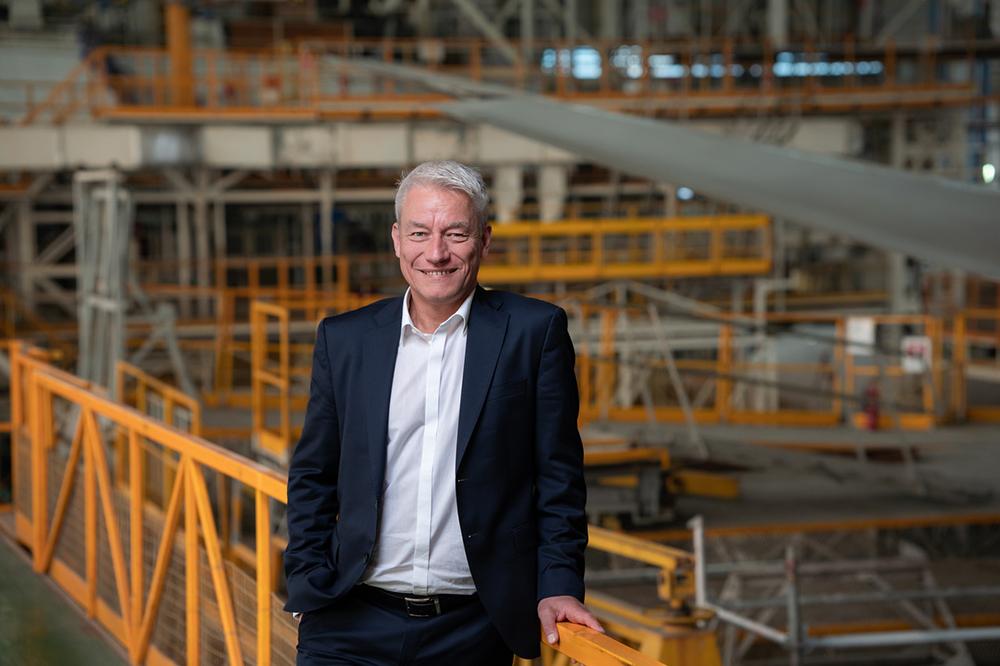
HAECO CCO Gerald Steinhoff
Gerald Steinhoff, HAECO’s chief commercial officer, speaks with Aviation Week Network about HAECO’s supply chain, labor and technology strategies as the company’s Hong Kong and Mainland China business booms back post-pandemic.
Hong Kong has been reopening relatively slowly post-pandemic compared to the rest of the world. How has this affected your operations? Is it buoyed by your work in China?
Hong Kong's relatively slow reopening after COVID-19 primarily impacted HAECO's line maintenance services, as fewer commercial airlines were flying to the city. However, this situation has since improved. HAECO was able to quickly ramp up operations as it had maintained its workforce during the pandemic. For example, Cathay Pacific is now on track to reach 100% of its pre-COVID capacity in Hong Kong. HAECO's business has been buoyed by increased activity from cargo airlines utilizing Hong Kong's strategic location as an international hub in the Asia-Pacific region. This trend is expected to increase further with Hong Kong's continued integration into the Greater Bay Area, which offers a consumer and technology market of over 80 million people. HAECO's diversified presence and operations in mainland China have helped offset the temporary slowdown in Hong Kong.
How are you managing talent and labor shortages in the MRO industry? What kind of foreign labor are you getting now?
To address talent and labor shortages in the MRO industry, HAECO is executing a multi-pronged strategy. The company is looking beyond its local Hong Kong market to source talent, recruiting 800-900 mechanics and engineers from the Chinese Mainland, the Philippines and India, as well as 50-60 experienced professionals in Greensboro, North Carolina. HAECO has also established 14 partnerships with technical colleges and training schools in the Chinese Mainland, its primary recruitment channel, with plans to scale this to 38 by 2024. In Hong Kong, the company collaborates with the Aviation Academy to provide on-the-job training. The Hong Kong government's facilitation of easier visa processes for foreign workers has been crucial, and HAECO works closely with Chinese Mainland officials to support its regional talent acquisition efforts.
As a longer-term initiative, the company is activating its employer value proposition and diversity and inclusion agenda to attract external talent and foster an inclusive work environment. HAECO's competitive edge is also its use of English as the primary business language in Hong Kong, simplifying the integration of international hires.
How have supply chain issues affected your operations in China and Hong Kong, and what are you doing to mitigate this?
HAECO's engine and component repair operations have been heavily impacted by supply chain disruptions, while its core MRO activities have been less affected. For engines, turnaround times increased dramatically due to parts shortages, forcing HAECO to prioritize shop visits based on customer needs. The company collaborated closely with Rolls-Royce and GE Aerospace, utilizing the broader engine network to share resources and reduce maintenance scopes. In contrast, HAECO's MRO work was less impacted, likely due to the slower reopening of the Hong Kong market compared to other regions, which dampened overall demand during the supply chain challenges. Nevertheless, HAECO has navigated the supply chain pressures through its supplier relationships and by leveraging its diversified operations across China and Hong Kong to shift resources as needed.
What new technologies and capabilities are you pursuing to make HAECO competitive?
HAECO is pursuing a multi-pronged strategy to maintain its competitiveness in MRO. The company is expanding its engine maintenance capabilities, introducing the latest engine types at its engine shops and collaborating closely with OEMs. HAECO is also diversifying its component repair offerings, including adding [General Electric] CF34 engine repair and globalizing its global engine support services, recently signing a contract with Safran. With the recent signing with GE Aerospace at Farnborough, HAECO will increase its direct customer services with the GE90 engine, allowing us to play a stronger role in the airline service market. We are also developing new GE9X capabilities to support the maintenance of this new-generation engine type.
To drive efficiency, HAECO is investing in automation and digitalization solutions, such as robots, drones and automated warehousing. The company is also implementing sustainable initiatives, like adopting electric vehicles. On the digital front, HAECO is developing customer-facing platforms to enhance transparency and collaboration. Additionally, HAECO is undertaking continuous improvement projects to optimize workflows and reduce turnaround times, like its collaboration with Porsche.
Are there any lessons learned from your prior experience at Lufthansa Technik that you’ve applied at HAECO?
I've found that there are general learnings you can apply when joining a new company based on your prior experience. In my case, that experience includes working at two highly professional aviation groups, MTU Aero Engines and Lufthansa Technik, as well as a medium-sized German company active in train and bus mobility, where I served as managing director. Across these diverse organizations, I encountered quite similar challenges as they grew from smaller, sometimes family-driven companies into larger enterprises. The key was professionalizing processes, tools and management culture to remain competitive long-term.
Some common areas of focus included adapting to globalization, placing a stronger emphasis on customer centricity, aligning operations with industry best practices and striking the right balance between team cohesion and individual subsidiary autonomy. These overarching lessons around professionalizing the business, becoming more customer-focused, and cultivating the appropriate organizational culture have been invaluable as I've transitioned to a role at HAECO. By drawing on my prior experiences, I've been able to help guide HAECO through similar challenges as it has evolved from a smaller player into a larger, more global aviation MRO provider.





